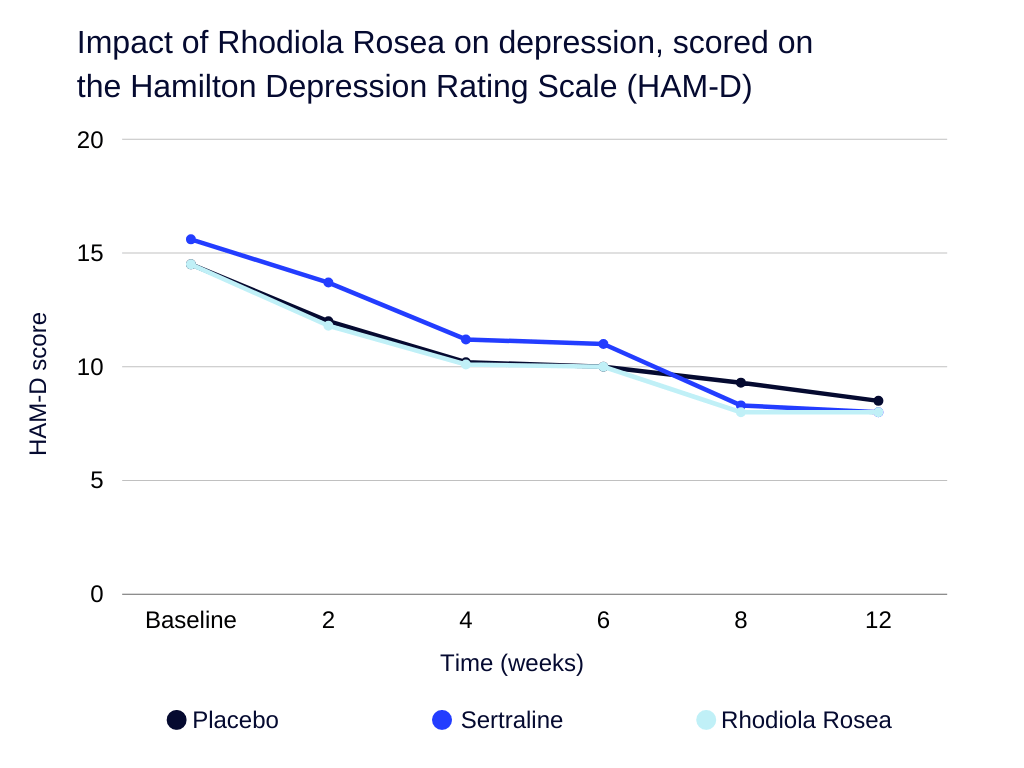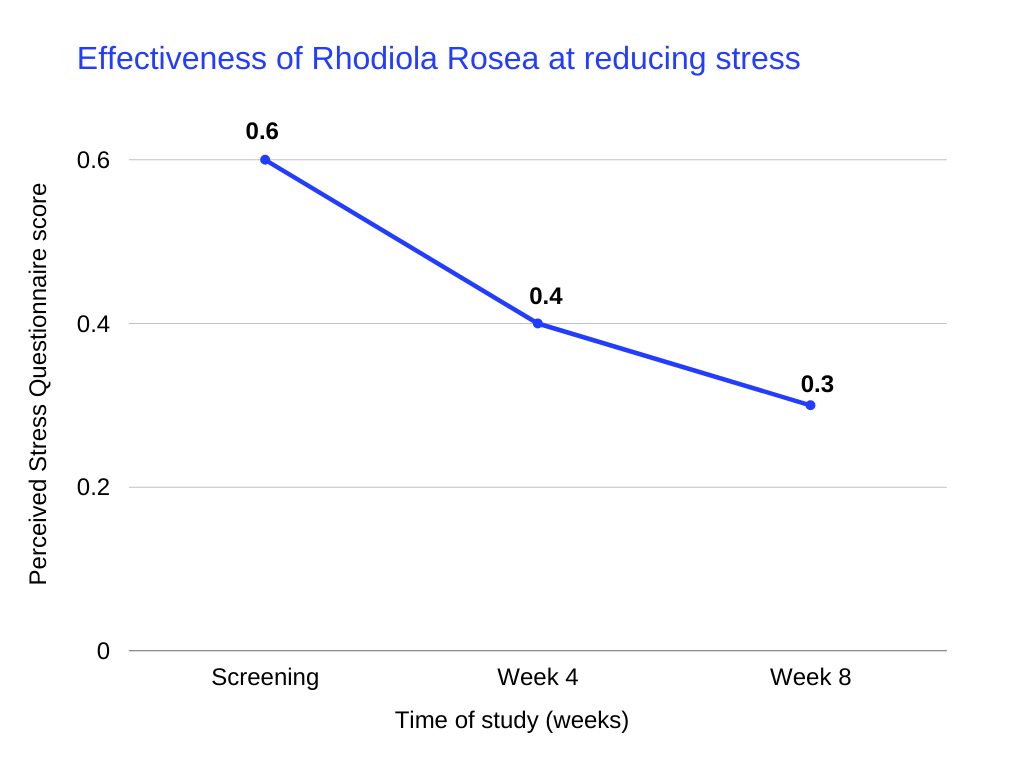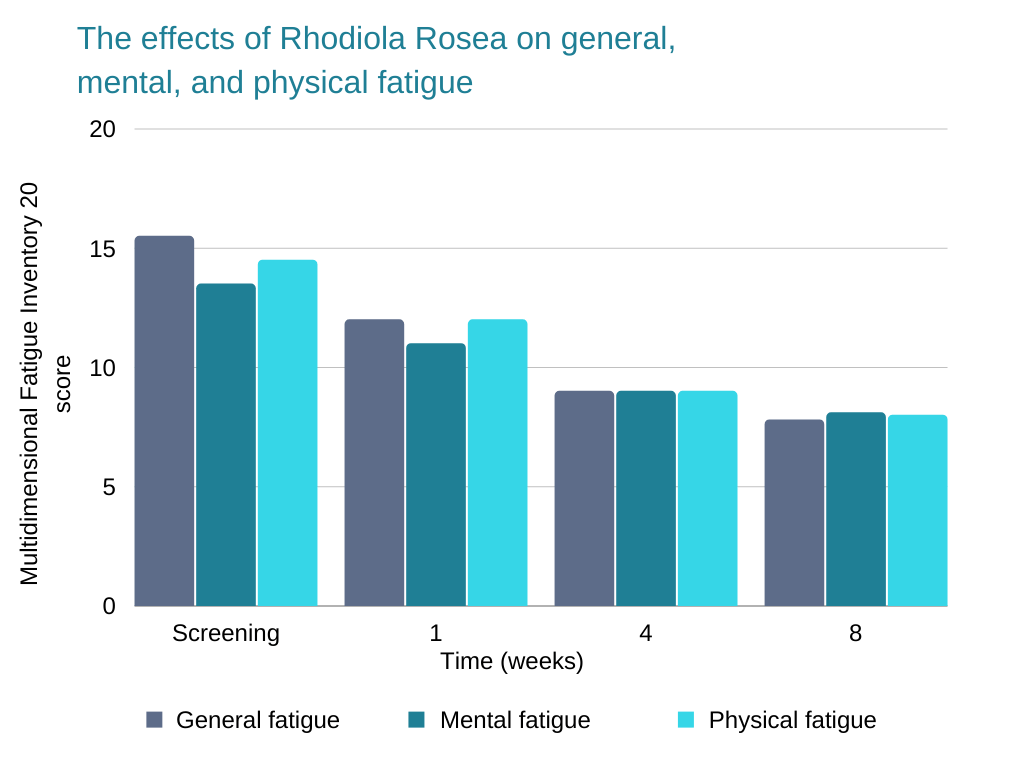Farrinstitute is reader-supported. We may receive commissions on purchases made through links on our site.
Rhodiola rosea, Golden root or Arctic root, contains 140 potentially health boosting compounds. It is complex, with alleged health benefits that range from reducing stress to managing diabetes and increasing athletic performance.
But can that be backed up by science, or is it folklore alone?
The mental herb has received much attention from botanists and clinicians alike, due to its many possible benefits. This article discusses them, alongside real evidence.
Like many other natural medicines, Rhodiola rosea is an adaptogen. Adaptogens are plant extracts that help organisms fend off stress caused by environmental factors. They are known for mood enhancing, stress relieving and energy boosting properties [1] [2].
Rhodiola rosea, known as Rose root too, is a popular traditional medicine that is native to cold climates and mountainous regions, such as Russia, Scandinavia and the Himalayas.
Rhodiola extract has been cultivated for centuries and widely used as a way to relieve depression and stress, enhance cognitive performance and boost physical performance [1].
In South Asia, Arctic root is said to have benefits for mountain climbers to help their body adapt. Rhodiola has been used for reducing altitude sickness and eliminating fatigue, much like coca leaves in the Andes.
However, traditional knowledge on increasing endurance has been disproved by scientific studies so far: no difference was found between Rhodiola supplements and placebo in human studies about reducing symptoms of altitude sickness [3].
Rhodiola rosea may support important physiological processes in the body, because they originate in the brain – that’s the reason it’s such a popular nootropic.
Science says that the active ingredients can stimulate the nervous system, increase neurotransmission, create antioxidant activity, regulate choline levels, increase cerebral blood flow, boost cerebral metabolism and have an anti-inflammatory effect [4].
How this works is: with antioxidants, the body and brain can remove harmful toxins that come from the environment and damage cells, protecting you from harm.
Stimulating the nervous system and neurotransmitters help cells communicate with one another between the brain and body, which can be conducive to physical performance (such as muscular activity) and supports healthy cardiovascular function.
Increasing cerebral blood flow and cerebral metabolism means that oxygen and glucose can travel around the brain. More oxygenated blood feeds the brain with nutrients and helps brain cells thrive.
Supporting choline levels, or increasing concentration of it in the brain, helps cells regenerate and reduces the effects of aging, like the degradation of neurons that causes memory loss;
Compounds with an anti-inflammatory effect reduce tissue damage to the nervous system and brain caused by natural aging and harm from infections. They are good for the immune system, too [4].
Rhodiola benefits you because of its neuroprotective effect, and it may support mental and physical performance. This can manifest as improvements in memory and learning, reduced stress, depression and anxiety, reduced physical fatigue or a boost in athletic performance [1].
It’s been used as natural treatment for chronic fatigue symptoms and depression for years, but there is little scientific evidence to back up these benefits.
It has also been tested as a way to improve the health of diabetics, those diagnosed with cancer and other diseases. However, there is still limited research on these effects [5].
Rhodiola rosea is said to help with these areas of mental and physical health:
There’s sporadic evidence that Rhodiola extract can prevent cognitive decline caused by Alzheimer’s disease. That is because of its alleged effect on cholinergic function in the brain and role in supporting neuronal growth [3].
A study shows that, particularly when combined with another natural medicine called Ginkgo biloba, there could be long term benefits for those with cognitive deficiencies. Bear in mind that this was a small study, though [3].
A meta-review of all clinical studies conducted on Rhodiola’s effects on learning and memory warns that almost all of the research results have a high risk of bias [3].
That means that the overall validity of Rhodiola studies about cognitive function is not confirmed [3].
There are clinical trials that demonstrate sustained administration of Rhodiola rosea reduces depression symptoms. It can reduce stress induced fatigue by combating effects of stress from the brain, allowing those with mild to moderate depression relief and an energy boost, plus increase mental performance [6].

Rhodiola rosea extract could be a way to reduce mild cognitive impairment caused by mental health problems like stress and depression [6].
In a study with 80 participants, those taking Rhodiola supplement self-reported a reduction in anxiety, stress, anger and depression after two weeks. They were said to display significant improvements in their mood overall [7].
Stress and stress related fatigue is for many, an outcome of everyday life. Of 1,375 participants who were suffering from stress, four weeks’ worth of treatment with Rhodiola rosea was found to reduce life stress symptoms to “a clinically relevant degree” [8].

Enhanced exercise performance could be one of many benefits to taking Rhodiola rosea. In a study of 14 athletes supplemented with Rhodiola rosea for four consecutive weeks, blood samples showed that their body’s abilities to recover from physical exercise increased after taking the herb [9].
Rhodiola rosea extract could be of use in combating mental and physical fatigue. Participants who used Rhodiola extract in medical trials displayed improvements in muscle strength, speed of movement, reaction time and had an increased attention span [10].
However, because the studies do not meet international research standards, the results are at high risk of bias [10].

Recent studies have explored Rhodiola’s pharmacological properties because it contains Salidroside, which may be effective in the treatment of diabetes. This compound helps brain metabolism, reduces oxidative stress and is an anti-inflammatory. These effects can help to regulate diabetes [11].
Nootropic herbs including Rhodiola contain anti-inflammatory cytokines that might play a role in preventing the growth and multiplication of cancer cells. Cancers can form following damage to cells that is caused by infection and resulting inflammation [12].
Research suggests anti-inflammatory compounds and antioxidants can help the body to fight this; thus preventing the growth of dangerous tumors [12].
Inflammation can cause other serious diseases, like asthma, gastric ulcers and sepsis. The incidence of sepsis is rising with the aging population and if it develops into septic shock it’s usually fatal [13]. Compounds like Salidroside, found in Golden root, have protective qualities against such conditions, because it can help the body mediate and reduce its inflammation response [12].
Generally, side effects of Rhodiola rosea active ingredients are rare and mild. Some people taking the herb may experience dizziness and either a dry mouth or excessive saliva production [14].
It’s not known whether Rhodiola rosea is safe to take if pregnant or nursing, therefore it’s better to avoid it during these times [14].
The FDA has warned against grander claims by some nootropic sellers that it may be used to treat serious diseases, because there is not a lot of evidence to back it up. If you have a serious condition like diabetes, Alzheimer’s or cancer, herbal supplements are not recommended to replace your usual drug administration as prescribed by a health care provider.
Rhodiola rosea’s lack of interaction with other drugs, and minimal adverse effects seen during use in clinical trials, make it attractive to clinicians as a safe dietary supplement [6].
If you are taking other medicine, it is best to check with your doctor before you start taking a nootropic. In rare cases herbal supplements can interact with certain drugs, such as tricyclic antidepressants.
Rhodiola dietary supplements can be used in capsule form, or concentrated Rhodiola extract may be consumed from a tincture. It is also a subsidiary ingredient in many pre-blended nootropics.
Rhodiola rosea extract is safe at an acute dose of 200 mg twice daily, according to clinical trials [8]. Most have tested the drug for a period of four weeks at a time, and more research may be needed on chronic use.
The initial effects of Rhodiola may work within 30 minutes of taking the supplement and are said to continue for four to six hours. There isn’t any scientific data on how long the nootropic stays in your system, although some supplement manufacturers claim it’s excreted from the body after two to three days.
Nootropic critics and the FDA caution against claims that Rhodiola can be a solution for more serious conditions. More research is needed about Rhodiola supplementation because the credibility of current studies on its health benefits is contested [3] [10].
We suggest there is little harm in trying it in collaboration with professional medical advice, if it interests you; but not to rely on all traditional health related claims.
Always seek out brands that are third-party certified from quality manufacturers. Below, we recommend some leading and trusted nootropic brands, which are quality assured.
We delve into the best Rhodiola products, according to our research and reviews.
If you are looking at boosting cognitive performance, there are also nootropics for memory and nootropics for motivation that are worth a look.
Mind Lab Pro supplements include Rhodiola root extract, and many other brain boosting compounds, that are effective nootropics for memory.
Gingko Biloba, L-Theanine and Tyrosine are well known herbs for a mood lift, increased concentration and better memory retention. Mind Lab Pro contains these and more —they experimented with B vitamins in their blend, which according to scientific information are excellent for brain health [15].
Take a look at our full Mind Lab Pro review for more supplement facts.
Qualia Mind nootropic stack contains 28 natural ingredients, including commercial Rhodiola. It also contains high levels of B vitamins, which have neuroprotective effects and are great for a cognitive boost. We’re unsure whether it is necessary to include that many ingredients, but the brand has a good reputation, and its nootropics are said to be of high quality.
Do you still have questions about Rhodiola rosea? Let us answer them for you!
Yes, there’s little evidence to suggest it’s not safe to take Rhodiola rosea dietary supplements in recommended doses.
Warnings out there against Rhodiola, including from the FDA, concern claims that the nootropic can treat serious diseases since there’s no solid evidence on that.
It could, but they are unusual and generally not serious. The most common side effects are nausea, a dry mouth, or salivation.
Yes: in fact, nootropic ingredients are recommended for daily use for at least a month to feel the benefits. However, clinical studies have not tested the herb for longer than a four week period, so information on the long term effects isn’t available.
There are studies to suggest that Rhodiola is good for treating symptoms of anxiety, stress and depression, due to its effect on the brain.
The problem with Rhodiola rosea is that the scientific evidence is not as strong as we might like, and more high quality studies are needed about Rhodiola supplements.
Yes, you can. They have slightly different benefits that could complement each other: Rhodiola is said to increase exercise performance, while Ashwagandha may have a calming effect. It might make sense for you to create your own nootropic stack based on your own needs.
Rhodiola rosea – does it work? There’s not enough evidence to confirm all of its alleged health benefits. However, many have a good subjective experience with the supplement. Nootropic ingredients with a neuroprotective effect could elevate you, and Rhodiola is safe as long as you are not taking it to treat something serious. If a natural boost to physical and mental performance is all you’re looking for, why not try it yourself, and see if it works!
There’s not enough evidence to safely confirm all benefits of this nootropic ingredient.